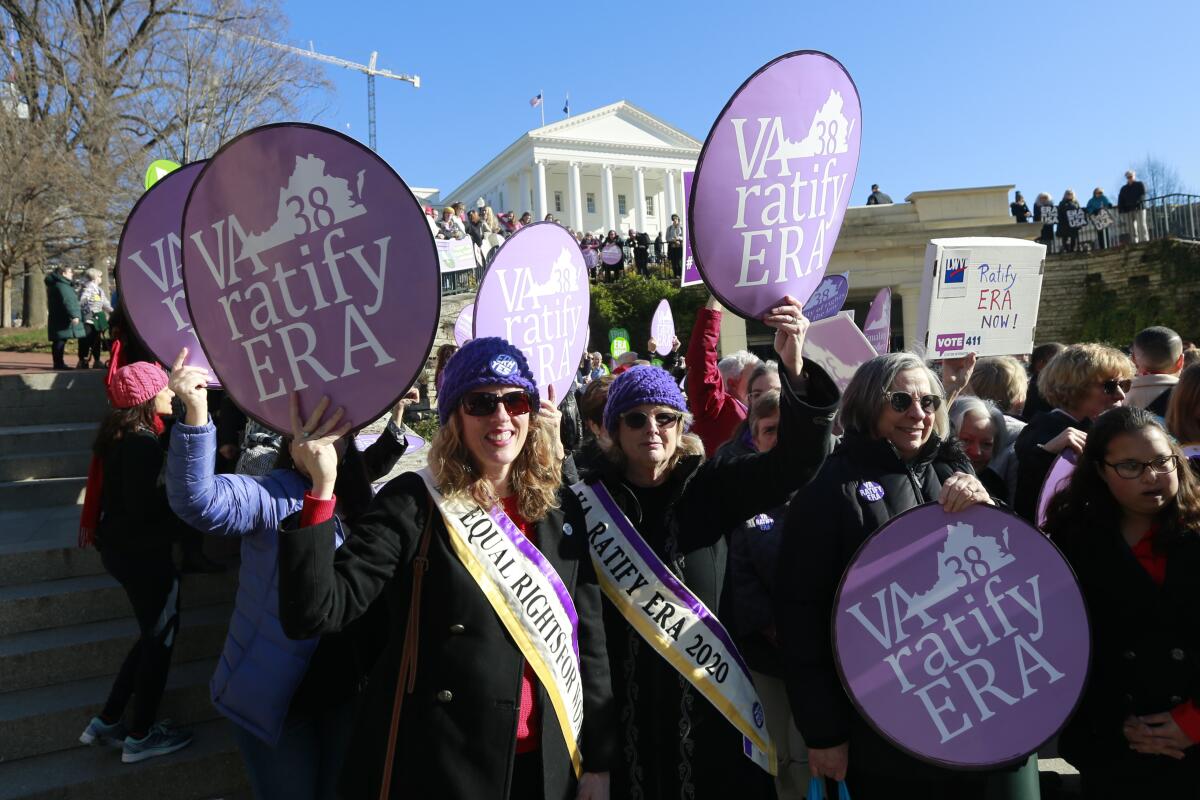Editorial: Will 2021 be the year women are finally declared equal under the U.S. Constitution?

Monday was International Women’s Day, a pseudo-holiday to highlight the global achievements of women — as well as the myriad ways in which they still don’t enjoy the same rights and opportunities as men.
To mark the occasion, President Biden announced the creation of the White House Gender Policy Council, which will report directly to him on strategies to advance gender equality and equity domestically and abroad. The council will coordinate federal efforts to combat gender-based discrimination, systemic biases and structural barriers, among other issues.
Great. Women have been waiting for equal rights under the law for, well, forever. And if Biden truly wants to accomplish the goal in the U.S., then he and his gender policy advisors must make adding the Equal Rights Amendment to the U.S. Constitution a priority in 2021.
It’s been nearly 100 years since the amendment explicitly outlawing sex discrimination was drafted, and 49 years since a two-thirds majority in both houses of Congress voted to send it to the states for ratification. Thirty-five states did so within the seven-year deadline that Congress also imposed, and there things stood for four decades until the Nevada Legislature unexpectedly voted to ratify in 2017. Illinois followed suit in 2018.
In January 2020, the Virginia Legislature became the 38th state to ratify, finally giving the ERA approvals in three-fourths of the states — the constitutional requirement for enactment. (Although five state legislatures had voted to rescind their ratifications, legal experts say the Constitution provides no such authority.) But because the original deadline set by Congress had lapsed, the national archivist declined to recognize the amendment. After Virginia, Nevada and Illinois sued to reverse the archivist’s ruling, a federal judge ruled against the states, saying Friday that it was just too late.
It was a setback for the cause of equality, but not the end of the road. There are still viable paths forward. For one thing, Virginia Atty. Gen. Mark Herring said he may appeal the ruling.
Ultimately, though, this is a matter best hashed out in Congress, which the U.S. Supreme Court has said has the power to decide the viability of a constitutional amendment.
There is a bill that would restart the entire ratification process, but that would be a giant step backward at a time when most state legislatures are controlled by a party opposed to constitutionally guaranteeing equal rights. More promising is bipartisan legislation in Congress to retroactively lift the lapsed deadline, which is expected to get a vote in the House next week. A similar bill passed the House last year, but it was stalled in the Republican-controlled Senate. The outlook is brighter with Biden in the White House, though the bill is still likely to face legal challenges if it passes.
That shouldn’t stop Congress or the president from doing the right thing — and soon. This is one window of opportunity that may slam shut in the next election. If it does, it could be years, maybe decades, before it cracks open again.
More to Read
A cure for the common opinion
Get thought-provoking perspectives with our weekly newsletter.
You may occasionally receive promotional content from the Los Angeles Times.










